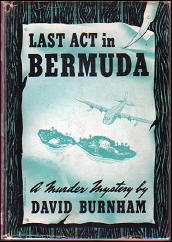Mon 18 Jul 2011
DAVID BURNHAM – Last Act in Bermuda. Charles Scribner’s Son, hardcover, 1940.
Even though there is a hint in the last paragraph that Inspector Steve Hamilton of the Bermuda Police Department may have had another case to solve, it didn’t happen. This is it, the only case he ever had — the only one recorded for posterity, that is — but nonetheless, it’s a good one. Better than good, as a matter of fact.

A thought occurred to me while reading this book, though, and I’m not exactly sure why it’s never occurred to me so strongly before, since I’ve known it all along, but this is what it was. That the settings of the mysteries that are part of the period that’s commonly known as the Golden Age of Detection – and 1940 is almost exactly in the center of the time frame, or just afterwards – that the setting and people involved were almost always of the upper crust, the jet set (before there were jets) the rich or the artsy or both.
The private eyes hung out in the gutters of society. The socialites had their world, and a certain segment of the reading population liked their detective fiction to take place in that world, not that they were part of that world, but that they enjoyed the opportunity to take a peek into that world and (perhaps) to see segments of that society broken down, just a little.
As you must have gathered by now, that’s the kind of mystery this one is. And since the youngish Inspector Hamilton’s kid sister Joan is romantically involved with the owner of the estate on the island just off Bermuda, he’s also there johnny-on-the-spot before the crime of murder is committed.
What this book is also about — and once again this is something that’s also very common in books taking place in the Golden Age of Detection — is a murder that takes place in a somehow isolated locale, in this case an island, and therefore resulting in only a limited number of suspects to be suspicious about. (Well, almost.)
The list includes the following: an young actor and a young actress; a man-about-town and his wife; a famous director’s wife; and a famous artist, female. Not to mention the host and one mystery guest, whom everyone seems to know and seems to have seen on the island before the surprise is ever announced.
Besides being involved with the host, Tony Bound –not to Inspector Hamilton’s pleasure — his sister Joan is also his “Watson,†as she amusingly discovers that a murder investigation is something very much to her liking: eavesdropping in on the questioning of the suspects, making timetables, and all of the other accouterments and other apparatus of solving a crime.
Either you like timetables in your detective fiction, or you don’t, but I do, even though I also like a private eye novel taking place in the lower echelons of society as much as anyone else. The detective work in this book I thought was excellent.
Worthy of a Queen? Yes, even so, and even with the cliched situations and settings that make themselves so noticeable that you cannot help but stumble over them, all I can say it that is it a shame that Joan never had the chance to help her big brother out like this again.
PostScript: This was the only work of crime fiction that David Burnham (1907-1974) produced, but Bill Pronzini, who provided the scan of the dust jacket above, suggests that perhaps he was also the author of Winter in the Sun (Scribner’s, 1937), a book about ranch life in the Arizona desert. The name’s the same, and the publisher’s the same, so the chances are better than good that it’s a match.
[UPDATE] 07-19-11. The following was sent to me by Victor Berch. I’ve decided to include it here with the review itself, rather than in the comments section:
Comment on Last Act in Bermuda, 1940.
Steve:
Bill Pronzini is certainly correct in his assumption that David Burnham, the author of Last Act in Bermuda (1940) was the author of the book Winter in the Sun (1937).
David Burnham was born March 2, 1907 in Chicago, IL, the son of an English immigrant, Claude G(eorge), a railroad traffic manager, and Mary (Gillis) Burnham, a native of Minnesota.
David was a graduate of Princeton University, where he was involved with its choral group: the Triangle Club. He and other members of the group wrote the words to a vocal score titled “Napoleon Passes.”
According to Al Hubin’s Crime Fiction Bibliography, he died in 1974. For some reason or another, I could not locate his name in the SSDI. Perhaps he had opted out of the program, which was perfectly legal way back then.
He is not to be confused with the David Burnham who was an investigative reporter for the New York Times.
Here is a list of his book publications:
1) This Our Exile. (New York: C. Scribners, 1931. London: P. Davies, 1931)
2) Wedding Song. (New York: Viking Press, 1934. London: Peter Davies, 1934)
3) Winter in the Sun. (New York: C. Scribners, 1937)
4) Last Act in Bermuda. (New York: C. Scribners, 1940)
He also has one entry in the Fictionmags Index for a short story titled “Turn the Page,†which appeared in the Saturday Evening Post Sept. 17, 1938
Victor
July 19th, 2011 at 5:17 pm
This author is completely new to me.
Thank you for all this information.
August 13th, 2011 at 4:54 pm
[…] opinion, that’s nearly as successful as David Burnham’s Last Act in Bermuda [reviewed here ]. To begin with, to set the scene, so to speak, let me quote from early on in the affair, from […]
February 12th, 2018 at 10:03 am
David Burnham, the mystery author, died Feb. 26, 1956, according to the Princeton University archives. Here is his grave:
https://www.findagrave.com/memorial/141215466/david-burnham